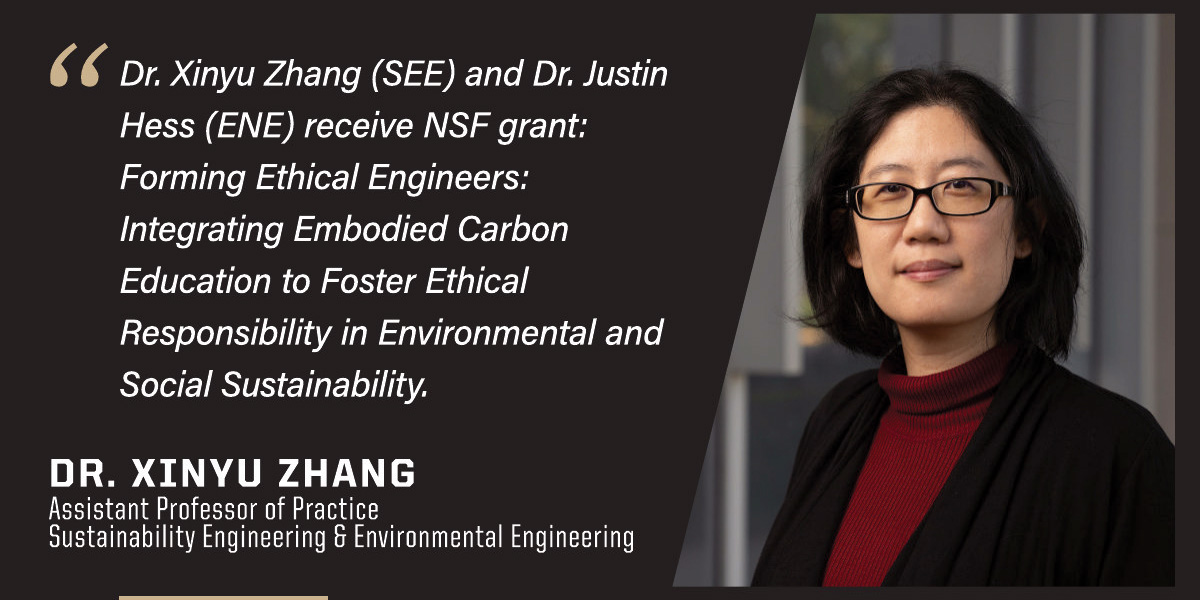Xinyu Zhang and Justin Hess Receive NSF Grant

Dr. Xinyu Zhang, Assistant Professor of Practice in the Purdue School of Sustainability Engineering and Environmental Engineering (SEE), was awarded a $213,925 grant award from the National Science Foundation for her project, “Forming Ethical Engineers: Integrating Embodied Carbon Education to Foster Ethical Responsibility in Environmental and Social Sustainability.”
Dr. Zhang is working as a principal investigator on the project along with co-principal investigator Justin Hess, a Purdue Associate Professor of Engineering Education.
“This is a collaborative effort involving researchers from multiple institutions,” said Dr. Zhang.
“I’m working closely with collaborators at Purdue University and West Virginia University who bring expertise in sustainability, ethics, and engineering education. As a new faculty with School of Sustainability Engineering and Environmental Engineering, I will start building my research team with this project.”
Their project will run from November 1, 2025 to October 31, 2028 in collaboration with West Virginia University.
“Collaborating with West Virginia University brings valuable perspectives and resources to the project. Their team has strong expertise in embodied carbon, and together we’re able to design more comprehensive and impactful educational modules. Additionally, with this partnership, we promote the ethical formation of hundreds of engineering students across two institutions, reaching a larger student population, including many low-income, rural, and first-generation students, and sharing best practices across institutions,” Dr. Zhang highlighted.
She provided further insight into this important work, stating,
“This NSF-Lemelson co-funded project seeks to examine how sustainability education aligned with the Engineering for One Planet (EOP) framework can support the ethical formation of globally competitive engineers, particularly their development of environmental and social responsibility for the enduring economic competitiveness of the United States. This project will integrate sustainability ethics modules into five engineering courses total across Purdue University and West Virginia University, directly promoting the ethical formation of approximately 800 engineering students across two institutions. The findings will contribute to the scholarship of engineering education and inform national efforts to strengthen undergraduate engineering instruction for a sustainable economic competitive future.”
When asked about the most important components of this project, Dr. Zhang shared,
“The ethical dimensions of sustainability that enable long-lasting economic competitiveness and public welfare advancement are often underemphasized. This project will advance research on how educational experiences shape students' professional and ethical formation. Our work will contribute to the knowledge regarding best practices in developing engineers who are not only equipped to design sustainable solutions but are also motivated to do so with a deep sense of responsibility to people and the planet. Additionally, this project is guided by the EOP framework developed by the Lemelson Foundation with input from industry, academia, and community, emphasizing a joint effort to develop a sustainable economic competitive future.”
Dr. Zhang celebrates that this project is more than just curriculum development.
“It’s about evolution of curricular integration of sustainability, from education about sustainability (bolt on) and education for sustainability (built in) to education as sustainability (redesign). We’re hoping to inspire a shift in mindset that prioritizes ethical responsibility for sustainable future as core values in engineering practice.”
Dr. Zhang is most excited about the potential to shift how engineering students think about their ethical responsibility as globally competitive engineers. By embedding ethical reasoning into technical education, Dr. Zhang is hoping to cultivate a new generation of engineers who are not only technically proficient, but also critically engaging with the environmental and societal impacts of engineering practice.
The NSF-Lemelson co-funding will allow Dr. Zhang and her team to scale their efforts, develop robust educational materials, and conduct rigorous assessments of student learning outcomes. It also enables them to engage with a broader network of educators and institutions, and amplify the reach and impact of their work.
Dr. Zhang credited Purdue SEE with providing a valuable foundation for her work:
“Being part of the School has been incredibly beneficial. The multidisciplinary environment fosters collaboration and innovation, and the School’s commitment to sustainability aligns perfectly with our project goals. I joined Purdue last year, the support from colleagues and leadership enabled me to adapt to the new work environment and build collaborations quickly and productively.”
For more information about Purdue’s School of Sustainability Engineering and Environmental Engineering, please visit: https://engineering.purdue.edu/SEE.
